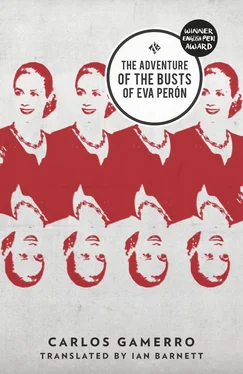But this time things were different: in spite of its immaculate hardback binding, The Corporate Samurai was a pocket edition, and Marroné could walk the empty corridors with utter impunity. And although he crossed paths with no one on the short walk, it was with a sense of triumph that, once the bathroom door was closed and bolted, he sat down on the toilet seat and opened the volume at the bookmarked page.
The Corporate Samurai belonged to a select minority of texts that had successfully applied the principles of millenary oriental wisdom to the modern art of management: titles like Dwight D Connoly’s The Art of Competition , adapted from Sun Tzu’s celebrated The Art of War ; or The Tao of Management by Dean Tesola, who brought the immemorial wisdom of Laozi to the conference table of a modern corporation. True, The Corporate Samurai lacked the astonishing relevance of the former and the philosophical depth of the latter, and sometimes lapsed into mere pedestrian substitution, mechanically replacing ‘samurai’ with ‘executive’ and ‘battle’ with ‘competition’, giving rise to entire paragraphs such as: ‘When the company enters into competition the executive must camp out day and night in the office, developing competitive strategies without a moment’s rest. It is necessary for employees of all ranks to dig any ditches, strongholds or outposts needed to protect the company from enemy attack and prevent them invading their markets and making off with their clientele.’ But it also contained paragraphs that could be described as sublime, such as its majestic opening, which Marroné always reread before embarking on the rest of the book: ‘What every executive must have constantly in mind, night and day, is that they will die. Death is their goal, their north, their main occupation.’ Marroné had meditated long and hard on this astonishing idea, which he had first taken for a rather melodramatic variant of the executive’s maxim ‘Go to work every day expecting to be fired’, but subsequently, after reading further, had discovered a deeper meaning. For a samurai executive, following the Way of the Executive involved subordinating personal achievements and goals to a higher end: the good of the company, the honour or, as in his case, the very life of its president. European or American readers of The Corporate Samurai were lucky enough to be able to take the phrase figuratively, but in this antipodean reality the idea of death was no metaphor for demotion or dismissal, but a palpable and concrete possibility; nor was the battlefield merely that of commercial competition, but also that of the streets where modern executives had to fight it out day and night against bombs, machine-gunnings and kidnappings. Nonetheless, the essential virtues of The Corporate Samurai were its accessibility and reader-friendliness, and Marroné, who knew from experience that the effort of disentangling the meaning of a complicated text might prolong rather than facilitate the task he was engaged in, started to read:
Though the Way of the Executive first and foremost entails developing the qualities of strength and efficiency, he who develops only in these respects shall reach no further than becoming a rustic executive of little consequence. Therefore, even a lower-ranking executive will do well to try his hand at music — clumsy though he may be — at painting or literature or some other art, albeit in moderation. For he who becomes completely absorbed in it and neglects his professional duties shall turn soft of body and mind, and lose his martial qualities to become a self-absorbed, second-rate artist. If one should grow too passionate about an art, it is easy to behave like some bright and witty chatterer in the company of your serious and reserved fellow samurai. This may be amusing in terms of social life, but it is an attitude that does not befit the Way of the Executive.
At this point a number 3 interrupted the flow of the text and Marroné, who was always extremely punctilious when it came to footnotes, skipped to the bottom of the page to read the note in question:
3. Although modern western executives have not adopted the tea ceremony practised by samurai knights, they have developed other forms of professional and social contact. Golf, for example, has been highly popular with company people since the days of the big tycoons. Hence, the executive who wishes to progress in the world of business must at least be familiar with the correct way of gaining access to the golf course, and know how to choose his clubs and keep score correctly, for which it is recommended that he take a few lessons from a pro. The golf club is a most suitable place to close deals and forge personal relationships, far from the distractions of the office, and the spirit of golf, properly cultivated, can do much to sweeten the Way of the Executive.
Accompanying the downward motion of his eyes, as if a blockage had finally been removed, Marroné’s innards voided themselves placidly in one, and he closed the book and gave a sigh of relief. He hadn’t had such a good bowel movement since he’d started working at the company, he told himself, contemplating the profuse fruit of his belly while doing up his trousers and reaching for the flush button. There could only be one explanation for it: something deep inside him, something the meaning of which he wasn’t yet able to unravel, had loosened when he had set eyes on the mortal remains of what had in life been Sr Tamerlán’s index finger. Leaving the bathroom and advancing down the corridor with the buoyant stride of a moon-walker, Marroné felt like a new man, as if — how else could he put it? — his soul had returned to his body, and not without a secret frisson of impishness he smiled to himself: maybe the Montoneros had ended up doing him a favour after all.
To offset the day’s highs with an unquestionable low he was forced to share the lift to the car park with Aldo Cáceres Grey, the executive usurping the chair that Marroné yearned with all his heart and soul to sit in: marketing and sales at Tamerlán & Sons. Cáceres Grey was a perfect specimen of an endangered species: the high-born executive who owes his post less to his curriculum vitae than to his pedigree, and more to his golfing handicap than to his academic scores. Sr Tamerlán wasn’t in the business of hiring fops on the strength of their double-barrelled surnames, but as one of the surnames also happened to be his wife’s, and as his little nephew was only a minor pain, and his assistant manager obsessively efficient but a social liability, the balance between the demands of business and those of high society might appear quite sensible. But for Marroné, whose head teemed with new ideas fresh from the US, Cáceres Grey was nothing but a bar to the company’s progress, an obstruction blocking the new thinking that was changing the face of business across the world. And to cap it all his rival had had the cheek to bang Mariana, the twenty-year-old secretary that Marroné, hobbled by scruple and guilt, had timidly, almost cryptically, been wooing all spring. Screwing your colleague’s secretary violated the executive’s tacit droit de seigneur over his subordinates and was nothing short of an act of war, a gauntlet thrown in his face. Marroné had taken it up, unbeknownst to Cáceres Grey, and had secretly been choosing his weapons ever since. Which didn’t stop him answering his rival’s condescending smile with a frank and open one, as recommended in How to Win Friends and Influence People .
‘Well? Are the tower blocks selling or aren’t they?’ he asked with a toothy grin.
‘There’s a sucker born every minute. Hey… What about Uncle? Any news?’
Читать дальше











